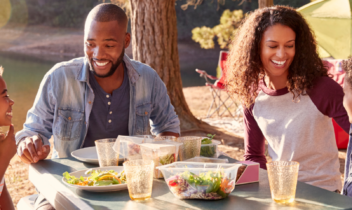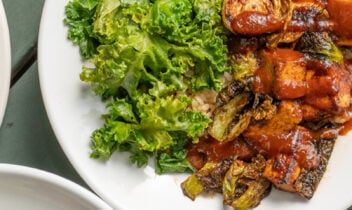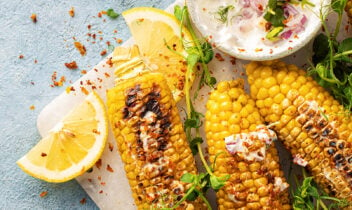
What’s Keeping You From Eating Fruits & Veggies?
Mom always said to eat your fruits and veggies but the sad truth is 90% of us aren’t meeting the minimum recommended intake for these nutrition powerhouses. New research also suggests that both real and perceived barriers often prevent us from thinking about, choosing and enjoying more fruits and veggies in our day-to-day life. And who needs that? With the internet and social media filled with conflicting information about food, nutrition, and diet, it becomes even more puzzling. Let’s set the record straight about five popular myths that may be keeping you from eating enough of these good-for-you foods.
- Myth: Canned and frozen fruits and vegetables are not as good for you as fresh.
Fact: Despite the perception that canned and frozen fruits and veggies aren’t nutrition-packed, the reality is they are packaged within five hours of harvest at their peak of ripeness, flavor and nutrient content. Therefore, their abundant supply of vitamins and minerals is locked in at nearly original levels. Studies document that canned and frozen foods provide as much – and sometimes even more – nutritional value as fresh ones do.
- Myth: Sugar in fruit is bad for you.
Fact: Fruit is a natural source of sugar. All fruits contain the same simple sugars, glucose and fructose, that are provided in sugar and honey. The difference is fruit also delivers a variety of other nutrients like vitamins A and C, folic acid, potassium, magnesium, and fiber. While some canned fruits are packed in sugar syrup, most are now available packed in 100% juice or sugar-free syrup. And most frozen fruits do not have sugar added in packaging. Bottom line: fruits provide nutrients our bodies need that promote healthy skin, vision and immune function among many others.
- Myth: Produce has pesticide residues.
Fact: Pesticide residues are not a concern for eating any type of produce. All pesticide residues on fruits and vegetables, whether organically or conventionally grown, are extremely low and well below any level that could put you at risk. Contrary to popular belief, organic farmers do use pesticides – natural pesticides like sulfur, bicarbonate, copper and vinegar – as well as synthetic pesticides approved for organic use. Pesticide residues on conventional produce are tested annually by the U.S. Department of Agriculture, with the results published in their Pesticide Data Program Annual Summary. Be sure to rinse fresh produce under cool running water to remove any small amount of pesticide residues as well as bacteria.
- Myth: Vegetables are too difficult to prepare.
Fact: “Veggies can be quick, easy and delicious if you know a few simple tips and tricks,” says chef and registered dietitian, Abbie Gellman. According to Gellman, fresh, frozen, and canned are all healthy choices. Frozen vegetables are one of her favorite simple, fast options because the preparation has already been done and they last months in the freezer, ready to go when you are. She suggests adding a bag of diced frozen carrots or bell peppers to pasta in the last two minutes of cooking. Another one of her easy ideas: toss a frozen bag of chopped broccoli with olive oil, salt and pepper, place on a sheet pan in the oven to roast for 20 minutes.
- Myth: Vegetables don’t taste good.
Fact: To some this may be a personal opinion. There was a time when overcooked, limp vegetables were the norm. Not any more according to culinary nutrition expert and registered dietitian nutritionist, Cindy Kleckner, who says there is no excuse for flavorless veggies. “It’s all about enhancing flavors with tricks like roasting to transform a vegetable from ho-hum to yum.” She recommends drizzling a little olive oil, kosher salt and freshly ground pepper on vegetables and oven roasting or skillet blistering to bring out a delicious caramelization. For even more flavor, add toasted nuts and a small trickle of maple syrup or pomegranate molasses.
Bottom line: with health top of mind these days, and we know everyone wants to try to do better, do not let these myths get in your way of eating more. Start simple. Start small. Make it easy. #haveaplant


